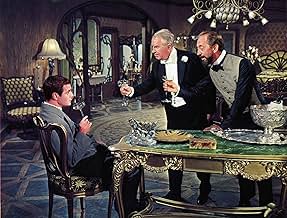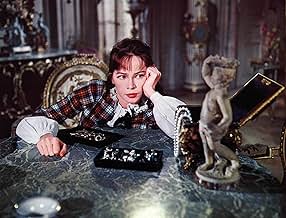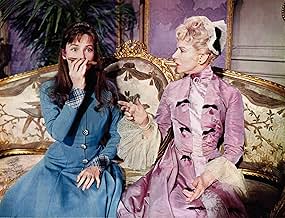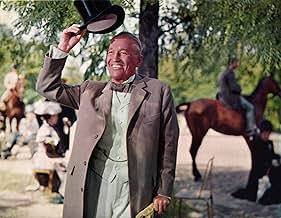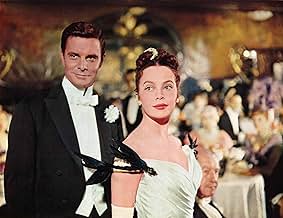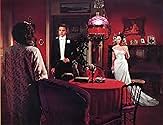Un vividor rico y una joven que se forma para ser cortesana, cansados de las convenciones de la sociedad parisina, disfrutan de una amistad platónica que puede dejar de ser platónica a corto... Leer todoUn vividor rico y una joven que se forma para ser cortesana, cansados de las convenciones de la sociedad parisina, disfrutan de una amistad platónica que puede dejar de ser platónica a corto plazo.Un vividor rico y una joven que se forma para ser cortesana, cansados de las convenciones de la sociedad parisina, disfrutan de una amistad platónica que puede dejar de ser platónica a corto plazo.
- Dirección
- Guionistas
- Elenco
- Ganó 9 premios Óscar
- 22 premios ganados y 9 nominaciones en total
- Girl at Maxim's
- (sin créditos)
- Waiter at "Palais de Glace"
- (sin créditos)
- A boy at Jardins des Tuileries
- (sin créditos)
- Harlequin
- (sin créditos)
- Gentleman in Park
- (sin créditos)
- Maitre d'Hotel Maxim's
- (sin créditos)
- Showgirl
- (sin créditos)
- Restaurant Patron
- (sin créditos)
- Gaston's Private Secretary
- (sin créditos)
- Girl on Horseback at Pré Catelan
- (sin créditos)
- Dirección
- Guionistas
- Todo el elenco y el equipo
- Producción, taquilla y más en IMDbPro
Opiniones destacadas
Production-wise, it's almost too lavish for its own good. Vincente Minnelli wrings every bit of artistic decor in the trappings, giving the viewer an almost claustrophobic feeling for the interior scenes. The outdoor shots are just as lavish--Louis Jourdan singing the title song among the fountains and architecture of French landmarks.
The cast is perfect. Leslie Caron makes an enchanting Gigi, Louis Jourdan is impossibly handsome as Gaston, and all of the other players were cast with a discerning eye.
But there is no denying that no matter how distasteful some will find the story of training a girl to become a courtesan to be (or how politically incorrect by today's standards), the score is as sparkling as the champagne they sing about. While, in my opinion, the score does not surpass "My Fair Lady" in range and cleverness, it certainly did well enough in winning nine Oscars, including the one for Best Picture of 1958. By all means, it has to be considered one of the last great musicals from the MGM period.
Only drawback: it's a bit overlong and could have used some editing for the slow moments.
Musicals are a rare genre on my "films I adore" list, but "Gigi" has long been a favorite film of mine, despite its sappy moments and sometimes corny jokes. What makes "Gigi" such a good film is its unmitigated Charm with a capital "C"; one can't help but grin a little when Chevalier sings "Thank Heaven for Little Girls" because he doesn't stop flashing that high voltage smile himself. And I cannot get through the scene between Chevalier and Gingold when they sing "I Remember it Well" by the seaside without tearing up because it is just so damn cute. Sure, the revelations and epiphanies are pretty easy and kind of out of nowhere, but considering it is an MGM musical from the 1950's, I would be surprised if there weren't these kinds of things. Everyone in the film looks like they are having a good time (particularly Chevalier), and the great Lerner-Loewe music against the Parisian backdrop is enough to sell me.
"Gigi", while being a 10-time Oscar winner (including Best Picture) has unfortunately been marginalized by some as a typical MGM fluff piece, could be a hard sell, particularly to the jaded Generation Y - and - younger audience. However, since I myself am probably one of the most cynical film-viewers I personally know of, take my word for it "Gigi" is a lot of fun, and a good way to spend two hours. 8/10 --Shelly
But let's face it, this is Americanized Collette. She celebrated the deals and compromises within a sexist order that allowed a lucky few high-class prostitutes to become well-to-do, independent women in fin-de-siecle Paris (and a lot of others to at least make some kind of living). She empowered women, at a time when there just weren't many other opportunities for them to establish real independence (our current categories of PC and non-PC wouldn't have meant much then). It wasn't always pretty, but there was reality in her writing about relations between the sexes that hasn't lost its relevance.
Of course, this had to be soft-pedalled for the American audience - hence the ending, which conforms nicely with middle-class morality on this side of the Atlantic. This is the only "politically" unsatisfactory thing about the movie, however. And it remains superior - both "politically" and as a film - to My Fair Lady, where Eliza is implied to return and submit herself to Rex Harrison at the end, whereas Gigi at least implies that it's Gaston rather than Gigi who is going to have to change his ways.
My only other gripe: Why no dancing from Leslie - and from Vincente Minelli, that peerless director of dance sequences? I guess Lerner and Lowe must have been more in control of this one, and weren't of a mind for rug-cutting. Too bad - there really isn't nearly enough of Leslie dancing on film as it is!
The three principals, Leslie Caron, Louis Jourdan, and Maurice Chevalier, along with the Paris locales helps maintain a distinctively French flavor, especially in the way the characters relate and interact.
For everyone who has commented on the political incorrectness of the story, a closer look will actually reveal the true feminist perspective of Colette's work which was groundbreaking for its time: 1) the story is a commentary and observation of the limited social and economic options for women outside of marriage during the turn of the century Paris, 2) Although Gigi (Caron) never fully masters her lessons and grooming, she is able to capture Gaston's (Jourdan) heart precisely because of her imperfections, and 3) most importantly, it is Gaston rather than Gigi who is forced to truly transform himself and defy the social conventions of the time to bring the story to its resolution.
Compare this to My Fair Lady, which offers similar social commentary but resolves itself in a more standard way: For example 1) Eliza Dolittle only becomes noticeable and lovable after transforming her outward appearance and speech patterns 2) Although Professor Higgins finally realizes his love for Eliza at the end, it is Eliza who is forced to submit her will by effecting a reconciliation that does nothing to resolve any of the issues raised in the scenes leading up to that point.
Definitely see Gigi and judge for yourself. (By the way, the widescreen version is sooooo much better. This is especially apparent in numbers such as "I Remember It Well" where entire characters are forced to be cut out of the screen.)
Oscars Best Picture Winners, Ranked
Oscars Best Picture Winners, Ranked
¿Sabías que…?
- TriviaWhen Alan Jay Lerner met Leslie Caron in London to discuss the film with her, he was surprised to discover that Caron, who was of French birth, had become so immersed in the English culture that she had lost her French accent.
- ErroresDuring Gaston's song by the pond thinking of Gigi, there is a fence in the pond forcing the swans to stay in close background. The swans, obviously confused yet undeterred, keep swimming into the fence attempting to get to the swan in deep background on the other side of the pond.
- Citas
Aunt Alicia: Love, my dear Gigi, is a thing of beauty like a work of art, and like a work of art it is created by artists. The greater the artist the greater the art. And what makes an artist?
Gigi: Cigars and jewelry?
Aunt Alicia: Gigi, you're from another planet.
- Versiones alternativasIn some prints shown on television, we see still photos of Leslie Caron part of the time during the song "Gigi", instead of seeing Louis Jourdan singing. (This occurs after the verse and first chorus, when the orchestra plays the song while Jourdan only exclaims "Gigi!") As shown currently, we see Jourdan singing throughout the whole song, as in the theatrical release.
- ConexionesEdited into Histoire(s) du cinéma: Une histoire seule (1989)
- Bandas sonorasThank Heaven for Little Girls
(uncredited)
Lyrics by Alan Jay Lerner
Music by Frederick Loewe
Performed by Maurice Chevalier
Selecciones populares
- How long is Gigi?Con tecnología de Alexa
Detalles
- Fecha de lanzamiento
- País de origen
- Idiomas
- También se conoce como
- The Parisians
- Locaciones de filmación
- Productora
- Ver más créditos de la compañía en IMDbPro
Taquilla
- Presupuesto
- USD 3,319,355 (estimado)
- Tiempo de ejecución1 hora 55 minutos
- Color
- Mezcla de sonido
- Relación de aspecto
- 2.35 : 1
Contribuir a esta página



